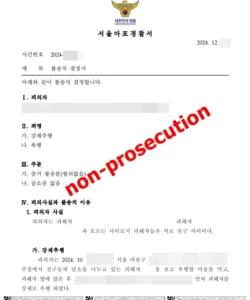With the steady increase in international marriages, the number of international couples residing in Korea is becoming impossible to ignore. On the other hand, the increased number of spouses with foreign nationality also means that the number of divorces with foreign spouses is increasing.
As of 2021, there were around 160,000 marriage migrants in Korea, and of those, around 130,000 were women. In order to extend their marriage migration visa, they must prove their marriage status every three years. If the marriage to a Korean spouse breaks up or if the Korean spouse files a lawsuit to invalidate the marriage, there is a risk that the foreign spouse may become an illegal immigrant. The Korean government says that the purpose of the regulations is to catch fake or fraudulent marriages, but it is also a fact that some Korean spouses abuse these visa regulations as a way to threaten their non-Korean spouse.
If you and your Korean spouse do not have any children, extending your visa can be rather difficult. Therefore, it is vital to prepare prior to the divorce and seek the help of a family law attorney specializing in international divorce for expats living in Korea and who is familiar with the visa challenges of foreigners with Korean spouses.
This article will provide you with details on visa options and custody matters for foreigners who want to stay in Korea even after divorcing their Korean spouse.
1. Possible Visa Options for Staying in Korea before or after the Process of Divorce
Table of Contents
1) Korean F-6-1 Visa: Visa Extension during the Process of Separation or Divorce Litigation
A foreigner currently staying on a “spousal visa” can still renew their F-6 visa even if the period of stay has expired, if they are in the process of separating from the Korean spouse. Separation means that the couple is living separately for an extensive period, but still remains married.
It is also possible to extend your F-6 visa if you are in the middle of a divorce lawsuit with your Korean spouse, regardless of whether you are in the process of a trial or of an appeal.
2) Korean F-6-3 Visa: If the Foreign Spouse is not Responsible for the Divorce
If the reason for the divorce is that the foreign spouse could not continue the marriage due to the fault of the Korean spouse, the foreign spouse can apply for an extension of stay as if the marriage to the Korean spouse was still standing. This includes not only a divorce due to the fault of the other party but also the death or disappearance of the Korean spouse, for which the foreign spouse is not to blame.
Additionally, even if a foreigner divorces due to reasons for which they are to blame, he or she can still obtain permission to extend his or her stay if that person is supporting his or her family. After this has been verified through the submission of relevant documents related to dependents, the foreign spouse can obtain F-6-3 visa to extend their period of stay up to one year.
3) Korean F-6-2 Visa: If Child Custody or Visitation Rights are Granted
Those who are staying on an F-6-1 visa but are unable to maintain their marriage status due to a divorce or other reasons can continue to stay by switching to the F-6-2 visa if they and their Korean spouse have a child, or if they have been granted visitation rights. This does not apply, however, if you are raising a child born to a former foreign spouse. Permission to stay on the F-6-2 visa is only applicable to those who have a child with a Korean spouse.
It is also important to note that in such cases, the immigration office decides whether to allow the extension of the stay after verifying whether the foreign spouse has actual custody, or whether he or she is actively engaged with his or her child.
If granted, the residence permit period of the F-6-2 visa generally ends once the child is no longer underage. However, since January 28, 2021, a residence visa (F-2-15) was newly established for “child caregivers whose child has come of age.” Therefore, even if your child becomes an adult, you may be able to change your visa and continue to stay in Korea.
4) Korean F-1-6 Visa: Settling Domestic Affairs in the Case of a Divorce where the Korean Spouse is not at Fault
Even if you get divorced without a reason attributable to your Korean spouse and are thus not eligible for the F-6-3 visa, you may need to stay in Korea to take care of domestic affairs, arrangements regarding property division, and related matters. In this case, it is possible to obtain an extension of stay by submitting supporting materials that prove you must stay in Korea to handle these matters.
Therefore, if your F-6 visa extension is denied, you can ultimately apply for the F-1-6 visa. If obtained, it will give you time to take care of business affairs, your rental deposit, and so on. Usually, a period of six months up to a maximum of one year is granted. But if a related lawsuit is in progress, you may be allowed to stay even more than one year, or more precisely, until that lawsuit is concluded.
2. Non-Korean Parent Securing Custody in Case of a Divorce in Korea
If a foreigner had a child after getting married with a Korean, the matter of obtaining custody of the child in the case of a divorce is very important, since it also impacts your chance of being allowed to stay in Korea. But even if you do not have custody, you may still extend your stay in Korea if you have at least been granted visitation rights.
Many of our clients seeking guidance from our divorce and child custody lawyers fear that they might lose custody of their children or will be forced to leave Korea due to reasons such as an inability to communicate in Korean or their financial abilities. However, Korean courts argue that changing the circumstances regarding parenting and caretaking of children has a greater impact on a child’s development than the custodial parent’s Korean language skills or financial ability and have therefore granted custodial rights and parental rights to non-Korean parents.
If you are planning to divorce and are concerned about the impact of the divorce on your visa status, require guidance on the parental rights that foreign parents in Korea have, or seek legal support with your international divorce in Korea, you can reach out to our Korean lawyers at Lee & Lee law firm. We can also assist you with divorce litigation procedures or custody disputes in Korea and put in every effort to help you secure custody or visitation rights in Korea as well as solve related visa issues.
3. Q&A (F6 Visa after Divorce)
Q1 I’m going to divorce my Korean spouse and we don’t have any children. Can I continue to stay in Korea?
A1. Maintaining the F-6 visa becomes difficult if you and your spouse do not have children. You can obtain an F-6-3 visa if it is proven through a divorce trial that the divorce is not your fault. For this process, the help of a skilled divorce attorney in Korea is required in order to prove your spouse’s negligence.
Q2. Is there a chance to get custody of my children if I get divorced from my Korean spouse?
A2. Of course. Korea does not discriminate against foreign spouses when it comes to deciding on custody and visitation rights. However, the custody decision may be impacted by who is discovered to be the faulty party in the divorce.
Q3. What are the biggest challenges for those holding an F-6 visa in Korea after they get a divorce?
A3. The greatest difficulties that F-6 Visa holders face after a divorce include securing their financial independence, adjusting their visa status, and if they have children, then preparing for child custody and supporting them.
Q4. Can I apply for permanent residency/citizenship in Korea after my divorce?
A4. Even though a divorce does not necessarily affect permanent residency or citizenship status, you must still meet all relevant requirements to be eligible for a transition from the F-6 visa to the F-5 visa, such as the length of your residency, language skills, and financial stability. Every factor is considered individually.
Q5. Can I change my F-6 visa to another type of visa after my divorce?
A5. Yes, you can change your F-6 visa to another type of visa if you meet the eligibility criteria for that visa. Common options include E-7 (Foreign National of Special Ability) if you are employed in a specialized field and D-8 (corporate investor visa) if you plan to start a business in Korea.
Q6. Can I work in Korea after getting divorced on an F-6 visa?
A6. Yes, F-6 visa holders can work in South Korea. If you were already working before your divorce, you can continue working. If you plan to start working after your divorce, you should comply with local employment regulations and notify immigration of your employment status.




